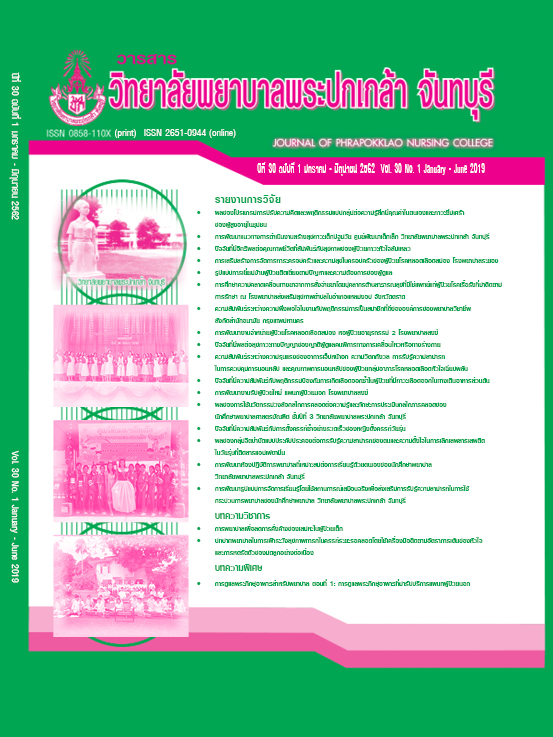Development of a Simulation-Based Learning Model for Encouraging Perceive Self-efficacy in Utilizing Nursing Process among Nursing Students at Phrapokklao Nursing College, Chanthaburi
Keywords:
Simulation-based learning, Perceive self-efficacy, Nursing process, Nursing studentAbstract
This research and development aimed to develop a simulation-based learning model and to examine its effectiveness on perceived self-efficacy in utilizing nursing process among nursing students. The samples were 117, 4th-year nursing students at Phrapokklao Nursing College, Chanthaburi in an academic year of 2017. The research instruments were composed of a question guideline for focus group, a simulation-based learning model, the simulations, a human model, the medical devices, a perceived self-efficacy in utilizing nursing process questionnaire with the reliability of .96, and a satisfaction on using a simulation-based learning model questionnaire with the reliability of .95. The implementation and data collection were conducted through 6 steps including: 1) collect and analyze data, 2) develop the model, 3) try out the model, 4) improve and develop the model, 5) test the model, and 6) evaluate the effectiveness of the model from October 27, 2017 to June 30, 2018. Content analysis, paired t-test, mean, and standard deviation were used for data analysis.
The research results revealed that the simulation-based learning model consisted of 3 stages including: stage 1, the teaching-learning situation analysis for developing the temporary model; stage 2, the learning management of simulation-based for encouraging perceived self-efficacy in utilizing nursing process; and stage 3, the reflection and evaluation the learning outcomes; 2) after learning, nursing students had statistically significant higher mean score of perceived self-efficacy in utilizing nursing process than before learning (t = 6.232, p < .001); and 3) the overall mean score of satisfaction on using a simulation-based learning model among nursing students was at a high level (M = 4.38, SD = .46).
This research suggests that nursing instructors should apply this simulation-based learning model as a guideline for nursing practicum learning management in order to encourage perceived self-efficacy in utilizing nursing process among nursing students.
References
มาลินี บุญเกิด, ฤทัยรัตน์ มั่งอะนะ, และสุกัญญา กระเบียด. (2558). ผลของการจัดการเรียนการสอนโดยใช้สถานการณ์เสมือนจริงต่อความมั่นใจและทักษะในการดูแลผู้ป่วยวิกฤติ. สืบค้นจาก https://administer.pi.ac.th/uploads/eresearcher/upload_doc/2015/proceeding/1444373072220903004511.pdf
วงเดือน สุวรรณคีรี, อรพิน จุลมุสิ, และฐิติอาภา ตั้งค้าวานิช. (2559). การจัดการเรียนรู้โดยใช้สถานการณ์จำลองสำหรับนิสิตนักศึกษาพยาบาล. วารสารพยาบาลศาสตร์ จุฬาลงกรณ์มหาวิทยาลัย, 28(2), 1-14.
วารุณี สุวรวัฒนกุล, และยศพล เหลืองโสมนภา. (2551). อิทธิพลของการรับรู้ความสามารถของตนเองในการใช้กระบวนการพยาบาล และความคาดหวังในผลการใช้กระบวนการพยาบาล ต่อการใช้กระบวนการพยาบาลของนักศึกษาพยาบาล วิทยาลัยพยาบาลพระปกเกล้า จันทบุรี. วารสารวิทยาลัยพยาบาลพระปกเกล้า จันทบุรี, 19(1), 58-67.
ศุภรัตน์ แจ่มแจ้ง, วิภารัตน์ ยมดิษฐ์, บำเพ็ญ พงศ์เพชรดิถ, ดวงแข พิทักษ์สิน, ปิยะนาฏ ช่างเสียง, และอังคณา หมอนทอง. (2560). ผลการเตรียมความพร้อมในการฝึกปฏิบัติการพยาบาลโดยใช้สถานการณ์จำลองเสมือนจริงต่อการรับรู้ความสามารถในการปฏิบัติการพยาบาลบนหอผู้ป่วย. วารสารพยาบาลกระทรวงสาธารณสุข, 27(พิเศษ), 46-58.
สมจิตต์ สินธุชัย, กันยารัตน์ อุบลวรรณ, และสุนีย์รัตน์ บุญศิลป์. (2560). ผลของการจัดการเรียนรู้โดยใช้สถานการณ์จำลองเสมือนจริงต่อความรู้ ความพึงพอใจ และความมั่นใจในตนเองของนักศึกษาพยาบาลชั้นปีที่ 4 ในการฝึกปฏิบัติรายวิชาฝึกทักษะทางวิชาชีพก่อนสำเร็จการศึกษา. รามาธิบดีพยาบาลสาร, 23(1), 113-127.
Bandura, A. (1977). Self-efficacy: Toward a unifying theory of behavioral change. Psychological Review, 84(2), 191-215.
Bandura, A. (1986). Social foundations of thought and action: A social cognitive theory. Englewood Cliffs, NJ: Prentice-Hall.
Bandura, A. (1997). Self-efficacy: The exercise of control. New York: W. H. Freeman.
Bandura, A., & Jourden, F. J. (1991). Self-regulatory mechanisms governing the impact of social comparison on complex decision making. Journal of Personality and Social Psychology, 60(6), 941-951.
Jeffries, P. R. (2005). A framework for designing, implementing, and evaluating: Simulations used as teaching strategies in nursing. Nursing Education Perspectives, 26(2), 96-103.
Kolb, A. Y., & Kolb, D. A. (2009). Experiential learning theory: A dynamic, holistic approach to management learning, education and development. In S. J. Armstrong & C. V. Fukami (Eds.), The SAGE handbook of management learning, education and development (pp. 42-68). Thousand Oaks, CA: SAGE.
Kolb, D. A. (1984). Experiential: Experience as the source of learning and development. Englewood Cliffs, NJ: Prentice-Hall.
Kolb, D. A. (1994). Learning styles and disciplinary differences. In K. A. Feldman & M. B. Paulsen (Eds.), Teaching and learning in the college classroom (pp. 151-164). Needham Heights, MA: Ginn Press.
Lundberg, K. M. (2008). Promoting self-confidence in clinical nursing students. Nurse Educator, 33(2), 86-89.
Winum, A. (2017). BSN students’ satisfaction and self-confidence in simulation-based learning (Undergraduate Honors Thesis). Boiling Springs, NC: Gardner-Webb University. Retrieved from https://digitalcommons.gardner-webb.edu/cgi/viewcontent.cgi?article=1010&context=undergrad-honors
Downloads
Published
How to Cite
Issue
Section
License
Copyright (c) 2019 JOURNAL OF PHRAPOKKLAO NURSING COLLEGE

This work is licensed under a Creative Commons Attribution-NonCommercial-NoDerivatives 4.0 International License.
เนื้อความ ข้อมูล และรายการอ้างอิงที่ผู้เขียนใช้ในการเขียนบทความเพื่อลงตีพิมพ์ในวารสารวิทยาลัยพยาบาลพระปกเกล้า จันทบุรี ถือเป็นความคิดเห็นและความรับผิดชอบของผู้เขียน คณะผู้จัดทำวารสารไม่จำเป็นต้องเห็นพ้องด้วยหรือร่วมรับผิดชอบ
บทความที่ได้รับการลงตีพิมพ์ในวารสารวิทยาลัยพยาบาลพระปกเกล้า จันทบุรี ถือเป็นลิขสิทธิ์ของวารสารวิทยาลัยพยาบาลพระปกเกล้า จันทบุรี หากหน่วยงานหรือบุคคลใดต้องการนำส่วนหนึ่งหรือทั้งหมดของบทความไปเผยแพร่ต่อเพื่อวัตถุประสงค์ใด ๆ จะต้องได้รับอนุญาตจากบรรณาธิการวารสารก่อน



